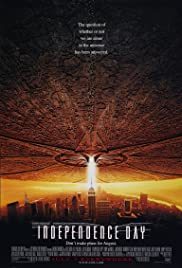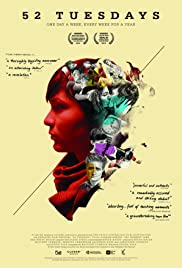Search

On July 2, a giant alien mothership enters orbit around Earth and deploys several dozen saucer-shaped ‘destroyer’ spacecraft that quickly lay waste to major cities around the planet. On July 3, the United States conducts a coordinated counterattack that fails. On July 4, a plan is devised to gain access to the interior of the alien mothership in space, in order to plant a nuclear missile.

Sixteen-year-old Billie’s reluctant path to independence is accelerated when her mother reveals plans for gender transition, and their time together becomes limited to Tuesdays. This emotionally charged story of desire, responsibility, and transformation was filmed over the course of a year—once a week, every week, only on Tuesdays.

UKIP: The First 100 Days is a 2015 mockumentary which was broadcast on Channel 4 in the United Kingdom on 16 February 2015, and in the run-up to the May 2015 general election. It tells the fictional story of how the country would be run if the UK Independence Party (UKIP), a Eurosceptic party, were to win the election and its leader Nigel Farage become Prime Minister. The programme is filmed in the style of a fly-on-the-wall documentary that follows UKIP’s first female Asian MP as she struggles with the party’s stance on immigration amid mounting public discontent with its hardline policies. The role of Deepa Kaur, who is elected to serve as MP for the Romford constituency, is played by Priyanga Burford.

Celebrate our countryandapos;s 246th birthday with the 42nd anniversary broadcast of Americaandapos;s Independence Day celebration for our entire nation.

For 17 years, filmmaker Jay Rosenblatt filmed his daughter Ella on her birthday in the same spot, asking her the same questions. In just 29 minutes, we watch her grow from a toddler to a young woman with all the beautiful and sometimes awkward stages in between. Each phase is captured fleetingly but makes an indelible mark. Her responses to her father’s questions are just a backdrop for a deeper story of parental love, acceptance, and ultimately, independence.

Ahn Jung-geun, a commander in the Korean Independence Army, leaves behind his country, his family and his mother Cho Maria. Ahn Jung-geun and his comrades cut off the last segment of their ring fingers as a symbol of their dedication to liberate their nation, and as a solemn oath to kill Ito Hirobumi, a man at the center of Japan’s occupation of Korea, within three years. To keep his oath, Ahn Jung-geun arrives in Vladivostok. Meanwhile, Seol-hee, the independence fighters’ informant, disguises herself to get close to Ito Hirobumi. She finds out that Ito Hirobumi will be heading to Harbin to meet with a Russian delegation, and urgently informs the independence fighters. The fateful day of October 26, 1909 arrives. Ahn Jung-geun, who has been yearning for this day does not hesitate to fire his gun at Ito Hirobumi at Harbin Station. Arrested on site, he is charged with murder and tried not in a court of Joseon but in that of Japan…

Two million fish washed ashore. One thousand blackbirds dropped from the sky. On July 4, 2009 a deadly menace swept through the quaint seaside town of Claridge, Maryland, but the harrowing story of what happened that Independence Day has never been told—until now. The authorities believed they had buried the truth about the tragedy that claimed over 700 human lives. Now, three years later, a reporter has emerged with footage revealing the cover-up and an unimaginable killer: a mysterious parasitic outbreak. Told from the perspective of those who were there and saw what happened, The Bay unfolds over 24 hours through people’s iPhones, Androids, 911 calls, webcams, and whatever else could be used to document the nightmare in Claridge. What follows is a nerve-shredding tale of a small town plunged into absolute terror.